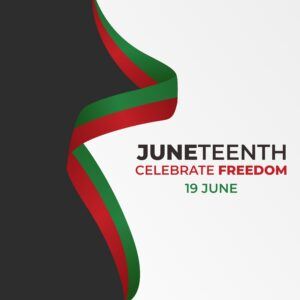Reflecting on Juneteenth and Its Significance Today
 Juneteenth (short for “June Nineteenth”) marks the day when federal troops arrived in Galveston, Texas in 1865, to take control of the state and announce that all enslaved people be freed. The troops’ arrival came a full two-and-a-half years after the signing of the Emancipation Proclamation. Juneteenth honors the end of slavery in the United States and is considered the longest-running African American holiday. (Source: History)
Juneteenth (short for “June Nineteenth”) marks the day when federal troops arrived in Galveston, Texas in 1865, to take control of the state and announce that all enslaved people be freed. The troops’ arrival came a full two-and-a-half years after the signing of the Emancipation Proclamation. Juneteenth honors the end of slavery in the United States and is considered the longest-running African American holiday. (Source: History)
Juneteenth serves as a reminder of the continued fight for equality and freedom for Black people in the U.S. Many activists and black community leaders refer to Juneteenth as Black Independence Day. As discussed in an interview on NPR, Union general Gordon Granger and a troop of Union soldiers traveled to Texas to announce that the Civil War had ended and that they were free, via General Order No. 3. The enslaved people in Texas were informed on June 19, 1865. They celebrated their freedom that day and on that same day the following year, 1866. In 1872, former slaves pulled together $800 to purchase 10 acres of land in Houston on which to hold the annual observation of Juneteenth. Now called Emancipation Park, the celebration is held there annually and across the nation. That tradition grew to be a nationwide celebration that has continued into the present day. In 2021, this celebration becomes more meaningful, as the nation continues to deal with racial inequity and is reminded of the impact the institution of slavery has had on this country. Learn “Why celebrating Juneteenth is more important now than ever” by P.R. Lockhart (published in Vox).
The passion to share the cultural significance of Juneteenth has also inspired alumna Angela Celeste May (Ph.D. 1997) and Love Mills-Byrd (Ed.D. 2011) to implement celebrations.
Dr. May combined her Union Ph.D. with a concentration in clinical organizational psychology and a love of music into an accomplished career. In addition to working as a clinical and organizational psychologist with subspecialties in forensic psychology and neuropsychology, she is a voice instructor at her undergraduate alma mater, Marygrove College. The talented vocalist, musician, and clinical psychologist originated Kwanzaa and Juneteenth celebrations at the college to broaden and educate students’ knowledge of the historic events.
Dr. Mills-Byrd joined with members of her church, Mt. Prospect Baptist Church, to implement the first citywide Juneteenth Rock Hill event in Rockhill, SC. In 2015 she served as the volunteer president of the first city-wide celebration, which is still going strong. Dr. Mills-Byrd holds a Union Ed.D. in Higher Education, her skills include higher education coaching, career counseling, adult education, student affairs, and curriculum development.
Learn more about the history and implications of Juneteenth.
____________________________________________________________________________________________________
Union is a global leader in providing higher education degrees for the adult learner. Your Goals. Your Success. Your Union. We’ve Got U!
Visit myunion.edu to learn more.